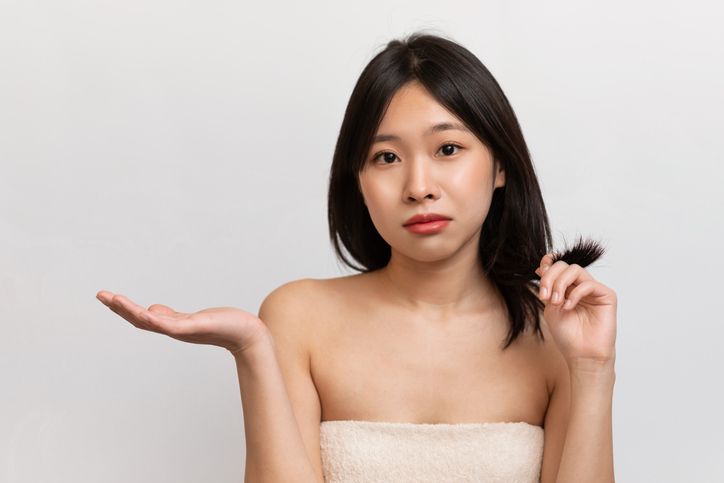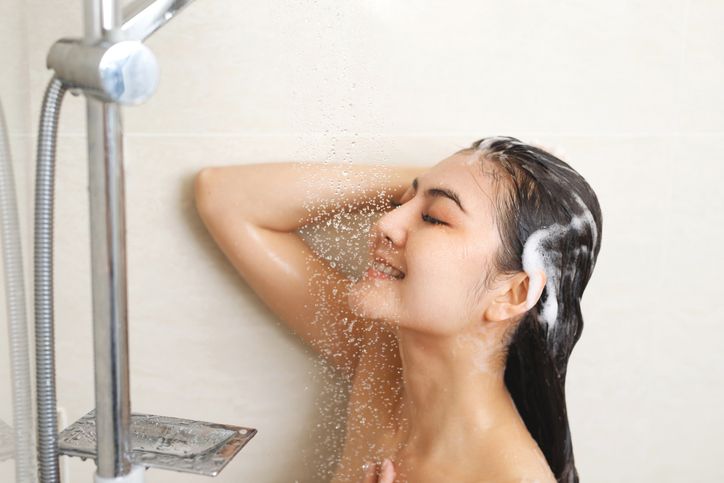
- Home
- Trend
- Weight Loss Strategies
- Acne Tips
- Hair Health Information
- Blemish Removal Tips
- Acne Scar Removal Tips
- Muscle Building Techniques
- Intimate Care Tips
- Postpartum Intimate Care
- Eye Bags Wiki
- Tips for Face Slimming
- Secret of Permanent Hair Removal
- Breast Enlargement Tips
- Cure to Snoring
- Marionette Lines
- Skin-Tightening Secrets
Hair loss is a common concern for many people. While it’s often attributed to illnesses or scalp conditions, your diet also plays a major role in the health and growth of your hair. According to nutritionists, modern eating habits—like frequent takeout, high meat but low veggie intake, and preferences for rich, high-calorie foods—are often culprits behind hair thinning. In this article, we’ll explore exactly what you should eat and which nutrients you should focus on to reduce hair loss.
What Should You Eat to Prevent Hair Loss? Nourish Your Scalp With These Key Nutrients!

i. Protein
Hair is primarily made of a protein called keratin. Without sufficient protein, your hair can become dry, brittle, and prone to breakage. It may also thin out or fall more easily. Protein also has antioxidant properties that help support healthy hair growth—particularly important for those with androgenetic alopecia.
Nutritionists recommend adults consume at least 1.5 palm-sized servings of protein-rich foods (like beans, fish, meat, or eggs) daily. Postpartum mothers should aim for at least two palm-sized servings to meet the higher protein demands for hair regrowth.
ii. Vitamin C
Hair contains a significant amount of collagen, and a deficiency can lead to dull, frizzy, or thinning hair. Vitamin C helps stimulate collagen production and improves keratin formation, which strengthens hair. It also supports the health of hair follicle stem cells and dermal papillae, both essential for hair regeneration.
iii. Vitamin B Complex
Vitamin B helps metabolize amino acids and prevents hair loss caused by excessive oil or dandruff. A lack of B vitamins can increase sebum production, leading to clogged follicles and hair thinning.
B6, B12, and folate are especially important for red blood cell production and scalp circulation—both vital for nourishing hair follicles.
iv. Vitamin E
As a natural antioxidant, Vitamin E creates an ideal scalp environment for hair to grow. Since the scalp ages six times faster than the face, antioxidants like Vitamin E are especially important. It protects follicles from oxidative stress, boosts hydration, and improves hair elasticity, softness, and shine.
v. Iron
Low serum ferritin (iron stores) is a common cause of hair loss in young women. Iron is a key component of hemoglobin, which transports oxygen in the blood. When iron levels are low, oxygen delivery to the scalp decreases, weakening the hair. Iron-rich foods like beef, organ meats, red amaranth, Chinese spinach, and dark leafy greens can help replenish stores.
vi. Zinc
Zinc plays a role in protein synthesis, immune support, and cell metabolism. Studies show people with hair loss often have lower zinc levels. Vegetarians, frequent drinkers, pregnant or breastfeeding women, and those with gastrointestinal issues are especially at risk of zinc deficiency.
vii. Biotin
Biotin is a water-soluble vitamin that supports amino acid metabolism and protein synthesis, contributing to scalp and hair health. While deficiency is rare, people who frequently consume raw egg whites may risk biotin deficiency. Raw egg whites contain avidin, which blocks biotin absorption and may increase hair loss risk.
viii. Unsaturated Fatty Acids
Dry, brittle, and breakage-prone hair can benefit from more omega-3 and omega-6 fatty acids. These healthy fats improve hair texture and strength while helping to prevent excessive hair shedding.
7 Hair-Friendly Foods to Add to Your Diet

i. Eggs
Eggs are rich in both protein and biotin—two crucial nutrients that promote hair growth and help reduce shedding.
ii. Berries
Packed with vitamin C, berries are antioxidant-rich and protect hair follicles from oxidative damage. Vitamin C also helps produce collagen, which strengthens hair and prevents breakage.
iii. Green Vegetables
Veggies like spinach, cabbage, and Swiss chard are full of vitamins A, C, folate, and iron. Spinach, in particular, is great for stimulating hair growth and supporting a healthy scalp. Vitamin A also promotes sebum production, which keeps the scalp moisturized.
iv. Avocados
Highly praised for their nutritional value, avocados are rich in vitamin E and healthy fats. Just one avocado provides 21% of your daily vitamin E needs and helps nourish the scalp for better hair growth.
v. Carrots
Carrots are rich in vitamins A, C, and E, as well as beta-carotene. Vitamin A enhances sebum production to prevent dry, brittle hair, while beta-carotene serves as a powerful antioxidant that protects hair follicles and encourages growth.
vi. High-Quality Nuts
Nuts like walnuts, almonds, cashews, pistachios, and macadamias are excellent for scalp and hair health. Brazil nuts, for example, are rich in selenium, which is essential for scalp function. Macadamias are loaded with beneficial fatty acids, and walnuts contain alpha-linolenic acid, omega-3s, and zinc.
vii. Deep-Sea Fish
Fatty fish like salmon are full of omega-3s, vitamin B12, iron, and high-quality protein. These nutrients help support scalp circulation and healthy follicle function—without contributing to weight gain.
免費體驗
F8 Hair Regrowth Treatment
1 Minute Self-Registration
Date should not be before minimal date
Hair-Nourishing Meal Ideas: 3 Easy Recipes to Try
i. Fo-Ti Egg Soup
• Ingredients: 60g Fo-Ti (He Shou Wu), 2 eggs
• Instructions: Rinse ingredients and place them in a pot with water. Simmer until eggs are fully cooked. Remove, peel, and halve the eggs, then return them to the pot and simmer for 5 more minutes.
• Benefits: Fo-Ti is known to support hair health, boost energy, and strengthen overall vitality.
ii. Black Sesame & Goji Berry Congee
• Ingredients: 30g black sesame seeds, 10g goji berries, 100g rice
• Instructions: Soak rice until soft. Rinse all ingredients and cook together into a smooth congee.
• Benefits: Nourishes the kidneys and blood, aids digestion, and is ideal for those with dryness-related hair loss.
iii. Peanut & Red Date Soup
• Ingredients: 100g peanuts, about 10 red dates
• Instructions: Soak peanuts until soft and peel them. Add to a pot with pitted red dates and simmer for about 30 minutes.
• Benefits: Red dates boost blood circulation in the scalp, helping nutrients reach the hair roots more effectively.
Perfect Medical F8 Hair Regrowth Treatment—A Powerful Solution for Severe Hair Loss
While improving your diet and boosting nutrient intake can help with mild hair loss, it might not be enough for those with more serious conditions or who want faster results. In such cases, Perfect Medical’s F8 Hair Regrowth Treatment is a great option.
This treatment uses low-level soft laser technology that penetrates deep into the scalp to stimulate hair follicles and dermal papillae, activating new hair growth. The laser energy also enhances blood circulation in the scalp, helping deliver nutrients to where they’re needed most. When the scalp is nourished, other problems like split ends, scalp acne, dandruff, and thinning can be improved as well.
Right now, Perfect Medical is offering a free first-time trial of the F8 therapy! If you’re looking to give your hair a real boost, don’t miss out on this special offer.
Get the Offer: Perfect Medical F8 Hair Regrowth Treatment免費體驗
F8 Hair Regrowth Treatment
1 Minute Self-Registration
Date should not be before minimal date
FAQ

Why do people experience hair loss?
Hair loss can be caused by genetics, postpartum hormonal changes, hormonal imbalances, chronic stress, and more. Identifying the root cause is key to effective treatment.
How does improving your diet help reduce hair loss?
Healthy hair starts with a healthy scalp, and that requires balanced nutrition. Nutrients like protein, iron, zinc, and vitamins C, B, and E support scalp health and hair growth. Eating better provides the foundation for stronger, healthier hair.
Which nutrients are most effective for preventing hair loss?
Protein, iron, zinc, unsaturated fatty acids, and vitamins C, B-complex, and E all play vital roles in maintaining healthy hair and scalp.
What foods help reduce hair loss?
Eggs, avocados, deep-sea fish, high-quality nuts, berries, and green vegetables are rich in the nutrients your hair needs to grow strong and stay healthy.
Does better sleep help prevent hair loss?
Absolutely. Quality sleep helps regulate hormones and supports cell repair and regeneration—especially important for scalp cells and hair follicles. Good circulation during sleep also helps deliver oxygen and nutrients to the scalp, encouraging healthy hair growth.








